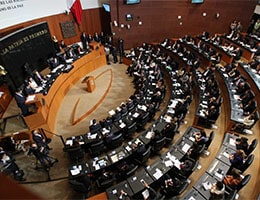 The verb confer comes from the Latin word conferre and refers to granting, allocating or attributing a right, a position or a power to an individual . Conferring can also consist of designating a quality that is not physical to something or someone.
The verb confer comes from the Latin word conferre and refers to granting, allocating or attributing a right, a position or a power to an individual . Conferring can also consist of designating a quality that is not physical to something or someone.
For example: “The jury decided to award the award to a young 20-year-old writer from Córdoba,” “I think the change in tactics will give greater strength to the team,” “The government should give priority to children and retirees.” when distributing social assistance."
Suppose that the directors of a cultural association decide to begin giving an annual award to a painter or sculptor who stands out for his or her contributions to the art world. For this they summon three recognized personalities to form the jury. These members of the jury, after debating and analyzing different possibilities, decide to award the prize to a certain artist: that is, they grant him the recognition in question for his merits.
The municipal authorities of a locality, for their part, can implement a licensing system to authorize local artisans to offer their creations on public roads. In this framework, they are responsible for granting these permits according to the fulfillment of different requirements: those who wish to access the licenses must be residents of the municipality and do not have to have a stable job, to name two of the requirements.
Finally, the members of a club can give the president of the institution the power to increase the fee with the aim of raising additional funds that will be used for the construction of a new sports center.
If we look at the Spanish Crown for a moment, for example, there is a series of functions called "relational", which encompasses royal acts with the Government and the Cortes Generales. Within this group of functions are those whose objective is to improve or complete the acts emanating from other bodies, whether they come from the Cortes Generales or the Government.
 The Cortes Generales can sanction and promulgate laws , call elections and the Cortes themselves, as well as dissolve them; The Government, for its part, has the power to propose the candidate for President, appoint and organize Government positions, confer military and civil jobs, as well as distinctions and honors , and issue decrees that the Council of Ministers previously approves.
The Cortes Generales can sanction and promulgate laws , call elections and the Cortes themselves, as well as dissolve them; The Government, for its part, has the power to propose the candidate for President, appoint and organize Government positions, confer military and civil jobs, as well as distinctions and honors , and issue decrees that the Council of Ministers previously approves.
Regarding the power to confer military and civilian jobs, it is necessary that this appointment be made following the laws to the letter. In other words, it is a legal configuration function; According to certain authors, the King has a margin of initiative in this attribution , although he must first be consulted by the Government and, once finalized, the act must be endorsed.
In short, the verb confer refers to providing a power to a third party who, in principle, could be the one granting it but, for certain reasons, "prefers" that the other be in charge of administering it. This entails a series of risks , since by conferring power or authority certain expectations are also planted that, if not met, can have consequences of varying degrees, depending on the case.
As expressed in the previous examples, the government and authorities are the figures to whom the country confers a series of powers to guarantee the well-being and development of its people, although it is known that they do not always meet these objectives. There are many stories of corruption and abuse of authority by those who should set an example for the people, and in them the greatest risks of this concession of power can be seen.
